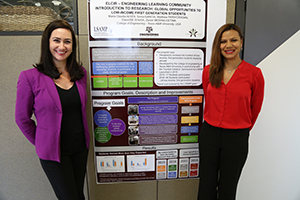 Dr. Sonia Garcia recently presented two posters at the World Engineering Education Forum and Global Engineering Deans Council 2016 in South Korea. Garcia, who is the senior director of Access and Inclusion in the Texas A&M University College of Engineering, presented on global opportunities for study abroad, recruiting international graduate students and research abroad opportunities for first-generation college students.
Dr. Sonia Garcia recently presented two posters at the World Engineering Education Forum and Global Engineering Deans Council 2016 in South Korea. Garcia, who is the senior director of Access and Inclusion in the Texas A&M University College of Engineering, presented on global opportunities for study abroad, recruiting international graduate students and research abroad opportunities for first-generation college students.
The theme of the conference was “Engineering Education for a Smart Society.” The main aspect of smart society, according to the conference website, is to make our society be more intelligent with new digital technologies. Engineers are crucial to applying the new digital technologies emerging today, and they must be educated and trained through innovative education.
Garcia presented the poster “ELCIR – Engineering Learning Community Introduction to Research: Global Opportunities to Low-Income First Generation Students,” authored with Maria Alves, director of the Haliburton Engineering Global Programs, as well as Matthew Pariyothorn, Dr. David De Sousa and Dr. Zenon Medina-Cetina.
THE ELCIR program was created with the intention of increasing the number of students participating in research and studying abroad, more specifically low-income, first generation underrepresented minority students. In sum, the purpose of the ELCIR program is threefold: expose sophomore students early in their studies and careers in engineering to research; immerse students in cultural and global research; and provide students with the basic tools to prepare them for future research opportunities with the college of engineering and/or to pave the way into graduate studies.
The poster highlighted how the program was implemented, the outcomes and the impact on the students based on the analyses of a pre and two post surveys. The focus was on the global competencies developed by the students as a result of the program.
The second poster presented by Garcia, “Targeted International Graduate Recruiting – A Case Study for Recruiting Mexican Students,” was authored by Alves, Medina-Cetina, Martha Ortega, Alicia Navarrete Alonso and Victor Camara.
The college of engineering collaborated with CANIETI, the Mexican National Chamber of Electronics, Telecommunication, and Information Technology, on a pilot program to increase the number of high-quality graduate students recruited from Mexico. The poster presented the recruiting and selection process, the implementation and the results of the three years of the program. Insights into this project can serve as a model for international student recruitment.